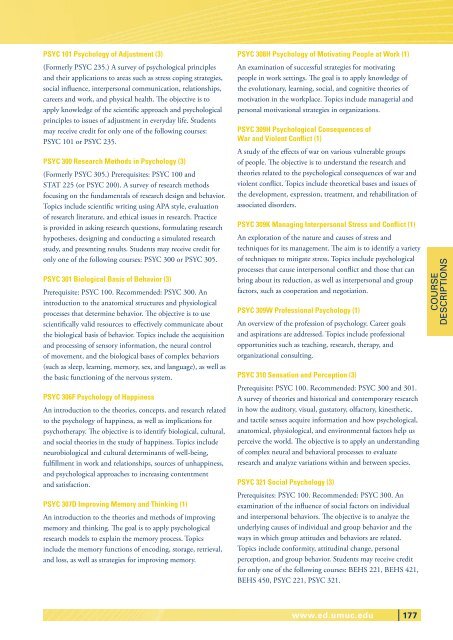Undergraduate Catalog - UMUC Europe
Undergraduate Catalog - UMUC Europe
Undergraduate Catalog - UMUC Europe
Create successful ePaper yourself
Turn your PDF publications into a flip-book with our unique Google optimized e-Paper software.
PSYC 101 Psychology of Adjustment (3)<br />
(Formerly PSYC 235.) A survey of psychological principles<br />
and their applications to areas such as stress coping strategies,<br />
social influence, interpersonal communication, relationships,<br />
careers and work, and physical health. The objective is to<br />
apply knowledge of the scientific approach and psychological<br />
principles to issues of adjustment in everyday life. Students<br />
may receive credit for only one of the following courses:<br />
PSYC 101 or PSYC 235.<br />
PSYC 300 Research Methods in Psychology (3)<br />
(Formerly PSYC 305.) Prerequisites: PSYC 100 and<br />
STAT 225 (or PSYC 200). A survey of research methods<br />
focusing on the fundamentals of research design and behavior.<br />
Topics include scientific writing using APA style, evaluation<br />
of research literature, and ethical issues in research. Practice<br />
is provided in asking research questions, formulating research<br />
hypotheses, designing and conducting a simulated research<br />
study, and presenting results. Students may receive credit for<br />
only one of the following courses: PSYC 300 or PSYC 305.<br />
PSYC 301 Biological Basis of Behavior (3)<br />
Prerequisite: PSYC 100. Recommended: PSYC 300. An<br />
introduction to the anatomical structures and physiological<br />
processes that determine behavior. The objective is to use<br />
scientifically valid resources to effectively communicate about<br />
the biological basis of behavior. Topics include the acquisition<br />
and processing of sensory information, the neural control<br />
of movement, and the biological bases of complex behaviors<br />
(such as sleep, learning, memory, sex, and language), as well as<br />
the basic functioning of the nervous system.<br />
PSYC 306F Psychology of Happiness<br />
An introduction to the theories, concepts, and research related<br />
to the psychology of happiness, as well as implications for<br />
psychotherapy. The objective is to identify biological, cultural,<br />
and social theories in the study of happiness. Topics include<br />
neurobiological and cultural determinants of well-being,<br />
fulfillment in work and relationships, sources of unhappiness,<br />
and psychological approaches to increasing contentment<br />
and satisfaction.<br />
PSYC 307D Improving Memory and Thinking (1)<br />
An introduction to the theories and methods of improving<br />
memory and thinking. The goal is to apply psychological<br />
research models to explain the memory process. Topics<br />
include the memory functions of encoding, storage, retrieval,<br />
and loss, as well as strategies for improving memory.<br />
PSYC 308H Psychology of Motivating People at Work (1)<br />
An examination of successful strategies for motivating<br />
people in work settings. The goal is to apply knowledge of<br />
the evolutionary, learning, social, and cognitive theories of<br />
motivation in the workplace. Topics include managerial and<br />
personal motivational strategies in organizations.<br />
PSYC 309H Psychological Consequences of<br />
War and Violent Conflict (1)<br />
A study of the effects of war on various vulnerable groups<br />
of people. The objective is to understand the research and<br />
theories related to the psychological consequences of war and<br />
violent conflict. Topics include theoretical bases and issues of<br />
the development, expression, treatment, and rehabilitation of<br />
associated disorders.<br />
PSYC 309K Managing Interpersonal Stress and Conflict (1)<br />
An exploration of the nature and causes of stress and<br />
techniques for its management. The aim is to identify a variety<br />
of techniques to mitigate stress. Topics include psychological<br />
processes that cause interpersonal conflict and those that can<br />
bring about its reduction, as well as interpersonal and group<br />
factors, such as cooperation and negotiation.<br />
PSYC 309W Professional Psychology (1)<br />
An overview of the profession of psychology. Career goals<br />
and aspirations are addressed. Topics include professional<br />
opportunities such as teaching, research, therapy, and<br />
organizational consulting.<br />
PSYC 310 Sensation and Perception (3)<br />
Prerequisite: PSYC 100. Recommended: PSYC 300 and 301.<br />
A survey of theories and historical and contemporary research<br />
in how the auditory, visual, gustatory, olfactory, kinesthetic,<br />
and tactile senses acquire information and how psychological,<br />
anatomical, physiological, and environmental factors help us<br />
perceive the world. The objective is to apply an understanding<br />
of complex neural and behavioral processes to evaluate<br />
research and analyze variations within and between species.<br />
PSYC 321 Social Psychology (3)<br />
Prerequisites: PSYC 100. Recommended: PSYC 300. An<br />
examination of the influence of social factors on individual<br />
and interpersonal behaviors. The objective is to analyze the<br />
underlying causes of individual and group behavior and the<br />
ways in which group attitudes and behaviors are related.<br />
Topics include conformity, attitudinal change, personal<br />
perception, and group behavior. Students may receive credit<br />
for only one of the following courses: BEHS 221, BEHS 421,<br />
BEHS 450, PSYC 221, PSYC 321.<br />
www.ed.umuc.edu 177<br />
COURSE<br />
DESCRIPTIONS






